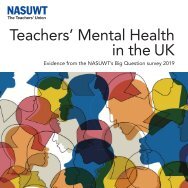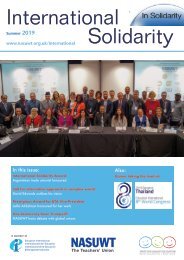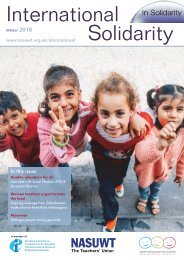International Solidarity Magazine (Spring 2020)
The NASUWT’s flagship international magazine highlighting the work of the NASUWT abroad and global education and human rights issues.
The NASUWT’s flagship international magazine highlighting the work of the NASUWT abroad and global education and human rights issues.
You also want an ePaper? Increase the reach of your titles
YUMPU automatically turns print PDFs into web optimized ePapers that Google loves.
Mental Health Crisis Highlighted
Teachers around the
world are being affected
by a mental health and
wellbeing crisis,
NASUWT Honorary
Treasurer Russ Walters
told delegates at the EI
World Congress.
He presented evidence
collected by the
NASUWT which showed
that teachers were
suffering increasing
stress levels and were not being given proper support,
despite being asked to take on extra responsibilities.
Two thirds of teachers in the UK have said teaching was
now seriously affecting their mental health, Mr Walters
said, which was the highest on record.
He told delegates: “There is now overwhelming evidence
of the mental health and wellbeing crisis affecting
teachers in schools in the UK and around the world.
“Year after year, we see evidence of teachers under
increasing stress, subjected to high-stakes accountability,
performance systems and targets and who are expected
to undertake additional responsibilities without adequate
or appropriate training or support.”
Citing the NASUWT’s annual Big Question Survey, Mr
Walters said 77% reported they had experienced
increased workplace stress in the last year and 85% said
they had an excessive workload.”
He added: “The situation can only be described as toxic,
with stress, excessive workload, under-resourcing and
adverse management practices creating an environment
in schools that is damaging to teachers’ mental health and
wellbeing.”
Disturbingly, NASUWT research also suggested that
hundreds if not thousands of teachers have self-harmed as
a result of the impact of their jobs, he told Congress.
He added: “This is tragic. In fact, it is a tragedy of
epidemic proportions. It is a disaster for our profession.”
He said unions and their members had to fight back
against bullying and adverse management practices and
take action to support and protect members through
industrial action.
He went on: “Governments must be shown using the only
language that they seem to care about, namely data, to
demonstrate the toll that this is taking upon teachers’
mental health and wellbeing.”
LGBTI Justice Fight Continues
There is still a great deal
of work to be done on
securing equal rights
and justice for all LGBTI
people, the NASUWT
told delegates at EI
World Congress.
NASUWT National
Executive Member
Debbie Hayton said
teachers played a key
role in “ensuring that
schools, colleges and higher education institutions are
free from the hatred, prejudice and discrimination of
LGBTI people.”
Ms Hayton said LGBTI rights were fundamental human
rights, enshrined in international laws.
“These rights are non-negotiable,” she told delegates.
But she said that, despite this, lesbians, gay men,
bisexual, trans and intersex people are exposed to
discrimination, violence and intimidation, based on
irrational fear, prejudice and hatred of LGBTI people.
The NASUWT secured commitments by EI affiliates
worldwide to:
(i) support member organisations in providing
information, support and training to challenge
homophobia, biphobia and transphobia;
(ii) highlight the need for global and national actions to
ensure that all teaching curricula are LGBTI-inclusive;
(iii) include LGBTI equality in all campaigns for the right to
quality education for all children, young people and
adults;
(iv) actively support LGBTI campaigning organisations
such as the International Lesbian, Gay, Bisexual, Trans
and Intersex Association (ILGA) and its member
organisations in securing equal rights for LGBTI people
around the world;
(v) highlight the need for national and local actions to
ensure schools are safe environments for LGBTI
teachers and students.
Other measures will include work by EI to:
• assess the impact of the EI programme and budget to
maximise EI’s contribution to securing LGBTI equality;
and
• press EI’s development co-operation partners to
ensure that their programmes are fully LGBTI-inclusive.
Ms Hayton said: “We have a responsibility to the children
and young people as well as society to educate against
bigotry and discrimination and to promote equality in all
its forms.
“Working with the international community, we must
continue to be at the forefront, securing the rights of all
LGBTI people.”
15






